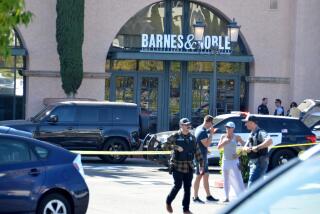Supreme Court Upholds Death Sentence in Fatal Stabbing of Oceanside Woman
- Share via
SAN FRANCISCO — The state Supreme Court upheld a man’s death sentence Thursday for fatally stabbing a 65-year-old Oceanside woman during a burglary of her home.
The justices unanimously rejected arguments that police lost or destroyed evidence that could have helped defendant Rudolph J. Roybal, and that the prosecutor violated his rights by quoting biblical language calling for death for murderers.
The missing evidence, a doorjamb from the victim’s house, wouldn’t have helped Roybal because it was never determined whether a fingerprint left on it was his, the court said. The justices said the use of a biblical passage was “clear misconduct” but was only a brief comment that was given no special emphasis in the prosecutor’s argument and couldn’t have affected the verdict.
Roybal was 33 in June 1989, when his neighbor, Yvonne Weden, was killed in her home in northern San Diego County.
Her husband, Paul, returned from his overnight job at a supermarket and found her body on the bedroom floor. Jewelry, some cash, a gun and a holster were missing.
Roybal, who had previously done some yardwork for the Wedens, left Oceanside by bus the night after the killing and returned to his mother’s home in Santa Fe, the court said.
He had cuts on his face when he arrived. When he offered to sell some jewelry to his half-sister, she called a probation officer and eventually led police to plastic bags in the backyard that contained the Wedens’ jewelry.
Roybal denied the slaying, but later told a court-appointed psychiatrist that he remembered nothing between the time he took drugs the day before the killing and the time he arrived in Santa Fe. The jury voted for death after initially deadlocking on the penalty.
There was no conclusive blood or fingerprint evidence at the murder scene, but a print was found on a doorjamb. Unable to lift the print, police photographed it and removed the jamb for further analysis. It disappeared from a police office before the defense could examine it.
Analyzing the photos, one defense witness testified that the print was not Roybal’s; other witnesses said it couldn’t be determined whether it was or wasn’t his print. Superior Court Judge David Moon found no bad faith by police and denied a defense request to tell jurors that police errors had made proper testing of the print impossible.
The Supreme Court upheld Moon’s ruling, saying police have a duty to preserve evidence only if its value to the defense was fairly clear before it disappeared.
The court criticized the prosecutor for telling jurors, toward the end of his closing argument, that in the language of the Bible, “the murderer shall surely be put to death.”
The biblical reference was an improper attempt to “invite the jury to find support for a death verdict in the religious text,” said the opinion by Justice Stanley Mosk. But in context, he said, the prosecutor was merely reminding jurors to judge Roybal primarily by his acts.
More to Read
Sign up for Essential California
The most important California stories and recommendations in your inbox every morning.
You may occasionally receive promotional content from the Los Angeles Times.













